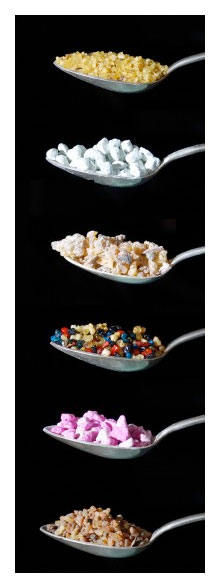About Incense

Frankincense, also called olibanum, is a gum resin obtained from trees of the genus Boswellia, particularly Boswellia sacra and Boswellia carteri (Burseracee).
The English word is derived from old French "franc encens" (i.e. pure incense).
Frankincense is tapped from the Boswellia tree by slashing the barkand allowing the exuded resins to bleed out and harden. These hardened resins are called tears.
Recent studies have indicated that frankincense tree populations are declining, partly due to overexploitation. In addition, burning, grazing, and attacks by the longhorm beetle have reduced the tree population.
Frankincense has been traded on the Arabian Peninsula and in North Africa for more than 5000 years. A mural depicting bags of frankincense traded from the Land of Punt decorates the walls of the temple of ancent Egyptian Queen Hatshepsut, who died in 1458 BCE.
Frankincense was a part of the Ketoret which is used when referring to the consecrated incense described in the Bible. The other components were stacte (נָטָף nataf), onycha (שְׁחֵלֶת shekheleth) and galbanum (חֶלְבְּנ khelbanah). The first two components of Ketoret are not determinted with absolute certainty yet, but they were most probably myrrh and black styrax.
When burnt, frankincense emits a fragrant odour, and hence the incense became a symbol of the Divine name (Malachi 1.11; Song of Solomon 1:3) and an emblem of prayer (Psaml 141:2; Luke 1.10; Revelation 5:8, 8:3). Together with myrrh, it was made an offering to the infant Jesus (Matthew 2.11).
The early Church did not use incense during Roman times, and frankincense was reintroduced to Europe by the Crusaders. It is also known as olibanum, which is derived from the Arabic al-lubān (roughly translated: "that which results from milking"), a reference to the milky sap tapped from the Boswellia tree.
The aroma of frankincense is said to represent life and frankincense is sometimes used mixed with balsams like Peru balsam or Tolu balsam to prepare the Holy Oil or Chrisma.
